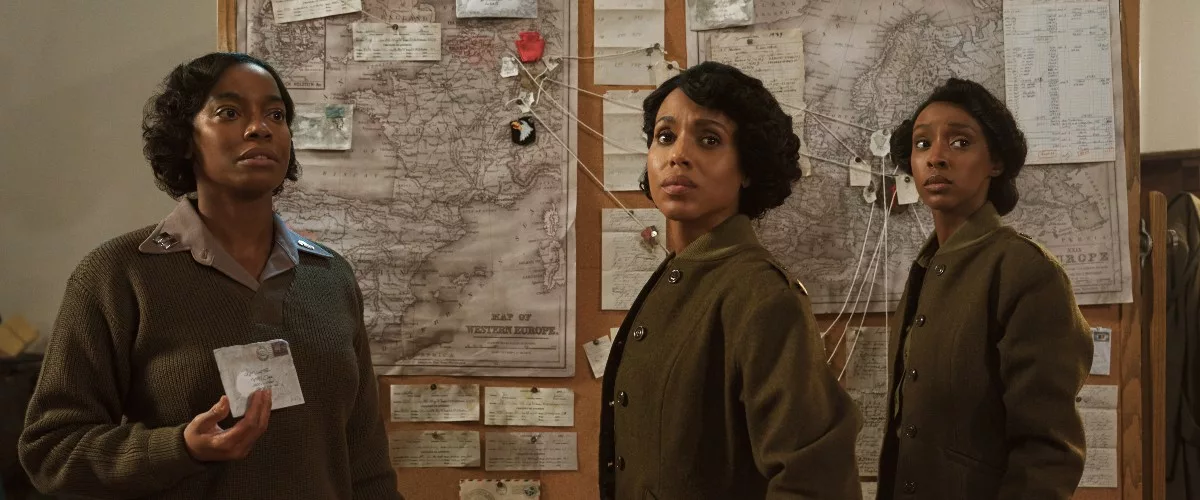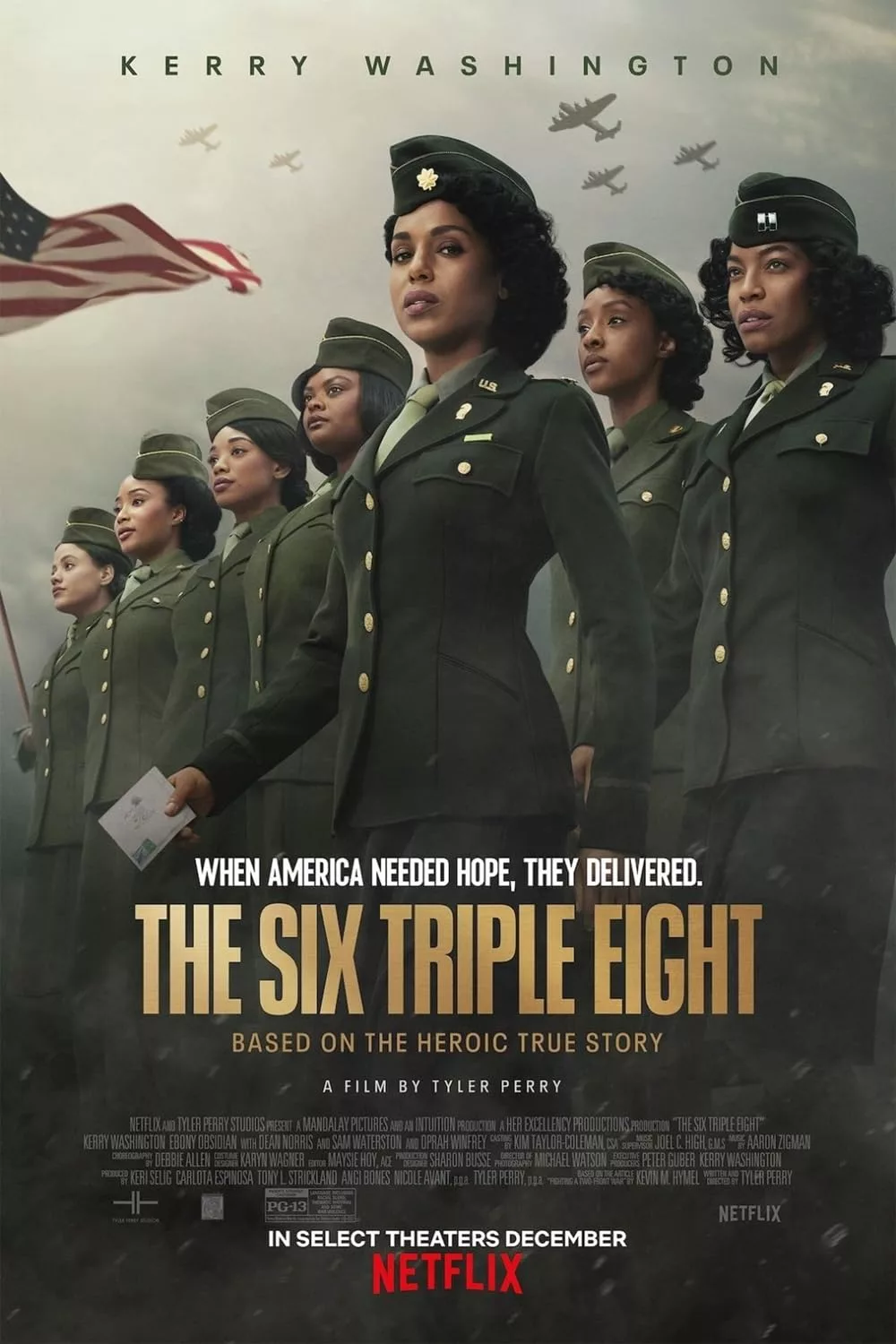In Tyler Perry‘s melodramatic war flick “The Six Triple Eight,” the quiet part is always extremely loud and incredibly close. Based on a true story, Perry’s second period piece following “A Jazzman’s Blues” recalls the women of the all-Black 6888th Central Postal Directory Battalion who faced ruthless racism while serving during World War II. While the Women’s Army Corps (WACs) has previously received some cinematic space, particularly Edward Buzzell’s “Keep Your Powder Dry,” Black servicewomen in the army have all but been erased. Here is a remarkable chance to tell their story, which makes the shortcomings of Perry’s take difficult to stomach.
“The Six Triple Eight” has its heart in the right place; it’s just not a particularly good film.
Perry’s writing is too fractal to neatly cohere. He opens his film in December 1943 at San Pietro, Italy, with a major set piece. A white soldier winds through trenches, then storms the broken landscape with his battalion only to narrowly miss a downed fighter’s fiery impact with the ground. The soldier pulls the pilot from the wreckage, taking a bloody letter from him that’ll sit undelivered in an army warehouse for years. From the battlefield, Perry leaps backward to 1942 in Bloomfield, Pennsylvania, where Lena Derriecott King (Ebony Obsidian) is bidding adieu to her white Jewish boyfriend Abram David (Gregg Sulkin). His sudden death during the war spurs us forward to 1944, at Fort Oglethorpe, Georgia, where a newly enlisted King falls under the command of Major Charity Adams (Kerry Washington). These events all happen in the film’s clunky opening act, causing a kind of narrative whiplash.
A similar imbalance occurs with Perry’s inability to merge King and Adams’ stories elegantly. King is placed at the center of the film’s intended emotion. Her grief for David is so fresh that she struggles to reciprocate the attention given by handsome serviceman Hugh Bell (Jay Reeves)—the soon-to-be-married soldier is admittedly messy. She also sees David’s ghost everywhere. The petite King isn’t initially cut out for soldiering, and her inability to carry the physical and psychological burden put her under the ire of a demanding Adams. It’s a dogged Adams who symbolizes the activist spirit of the battalion. She takes the brunt of the racial slings thrown by her white superiors, like the distasteful General Halt (Dean Norris), who distrusts that Black women are capable of anything. Combining these strong-willed women should make for a potent mix. And yet, Perry is too invested in conjuring overwrought speeches to make either woman feel human. Instead, they have the subtlety of an ‘Uncle Sam’ poster.
Dialogue is often an issue for Perry, though not always a glaring one. His on-the-nose vocalization of his characters’ innermost feelings is part of the reason he is so beloved; the people in his films always say the quiet part out loud to hilarious and sometimes deeply emotional effect. In “The Six Triple Eight,” unfortunately, that style doesn’t play as well. Adams should be thunderous, confident and undeterred as she shouts orders and addresses these soldiers. But Perry gives Adams so few subtle moments, instances where we can see her personality, that most of Washington’s committed performance is broadly executed. The same can be said of the romantic conversations shared by King and David, which isn’t so much loving as extremely wooden and stilted. It’s as though Perry has written the pair as cliches of the Victorian era rather than teenagers in the 1940s.
The film’s garish VFX work is equally as shoddy. The opening battle sequence, for instance, is so flatly rendered you can practically spot the strings pulling the actors away from the cotton candy textured smoke and the fake fire that has as much body as cheap tin foil. The immaculately manicured sets very much feel like sets rather than lived-in spaces. Affectations afflict every component of this film too; syrupy accents and caked-on makeup abound.
When the film shifts overseas, Perry commands less of its rhythm. Spurred by a visit from a bereaved mother (Kerry O’Malley) searching for letters from loved ones, Eleanor Roosevelt (a committed Susan Sarandon) tells FDR (Sam Waterston) that action is required to disperse undelivered mail lest morale drop among the soldiers and the American people. On the suggestion of Mary McLeod Bethune (Oprah Winfrey), the 6888th are deployed to France to deal with the backlog. There, they persistently face dehumanizing racism: a conniving pastor, a disrespectful General Halt, and an apathetic bureaucracy that won’t even bury their fallen friends. These scenes are where the biggest speeches happen, often in such quick succession you can’t quite place where the applause should begin or end.
This film is strongest when Perry focuses on the sisterhood these women feel for each other. Most of King’s friends are fairly one-note, except for a blunt Johnnie Mae (Shanice Shantay)—who plays like the stereotypical comedic buxom Black woman who’s a constant in Perry’s work. Still, it’s these quiet moments, when the women go dancing or they’re emotionally caring for one another, especially in the face of misogynoir, where the film most aligns with “Keep Your Powder Dry.” That togetherness powers “The Six Triple Eight” to its tear-jerking conclusion.
What’s particularly frustrating about Perry’s take on this battalion’s story is the inherent poignancy their story holds. Even with his misbegotten creative choices, you can’t help but be touched by the unwavering spirit of these Black women. And to be sure, Perry does a great service bringing their history to viewers. You just wish he’d performed the last full measure of devotion by empowering a Black woman to tell this implicitly powerful story instead.
On Netflix now.




















